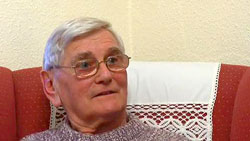 |
| Private Eric Reeves |
What happened was after they hit the camp in September 1944, I mean our camp, we know because we walked around the inside of it, was 220 yards by 220 yards square and that was all BAB21 in there. A thousand plus blokes and they hit the camp one day and about 32 of our blokes got killed or badly wounded. After that the German Commandant told our, what they call 'a man of confidence', Fusilier, Regimental Sergeant Major, if we would give them our parole they would open the gates and let us out when the air attack was imminent and he said "No, under our Queen’s Regulations we are not allowed to give our parole to the enemy and we will not do it". And they were getting a bit worried about casualties among us because of the Geneva Convention, because we were not supposed to be in an area where they were bombing, you see, and so what they said was "We will let you out of the camp, and if after so many hours, 12 hours after the all clear, it cannot be proved that you were either wounded or been a casualty of some sort and anyone has tried to escape, we will take 10 men at random and we will execute them". And they would have done. They did not mess about, they did not bluff. So everybody did come back. Now the oil refinery in itself was about 4 miles by 2. Huge place. Like two Dagenham Motor Companies sort of thing with all these huge buildings in there, it was a complete oil refinery. If you were in there you might have a mile to run when the sirens went and most of our old guys then, our guards, were old guys, I mean. We were 20 something and they were 40 something and we had one old puffer and he was not a bad old bloke, he shut his eyes to a lot of stuff. So when the first time we had him when there was an air raid, one of the blokes said "Right, Reevo, you take his haversack. Cain, you take his rifle, you carry his whatsisname and you big blokes carry him", and we would have him one under each arm and we would run like hell with the guard and when we got out of what we thought was the danger area, which it wasn’t always because when they carpet bombed you know they started about 3 miles up that way and finished about 3 miles that way, then we would sit him down under a tree and give him all his stuff back and then, when the all-clear went, we would do it all in reverse. I always make it sound like a holiday camp; it wasn’t really.